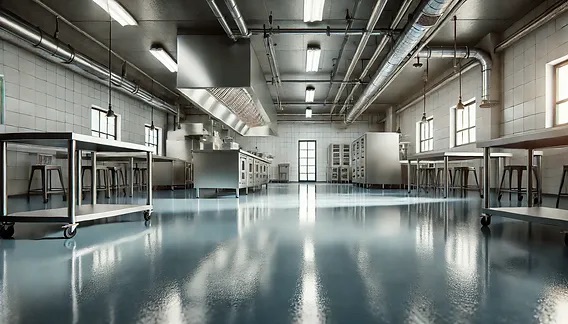In the fast-paced environment of a commercial kitchen, flooring must meet the highest standards of durability, safety, and hygiene. Spills, heavy foot traffic, hot liquids, and constant cleaning demand a surface that can withstand it all. Epoxy flooring stands out as the ideal solution for commercial kitchens, offering a combination of resilience, safety, and ease of maintenance that traditional flooring options often lack.
What is Commercial Kitchen Epoxy Flooring?
Epoxy flooring is a seamless, resin-based coating applied over concrete surfaces. It combines a resin and hardener to create a durable, plastic-like layer that bonds tightly to the substrate. For commercial kitchens, epoxy flooring provides a non-porous, slip-resistant surface that resists chemicals, heat, and heavy wear and tear.
Key Features of Epoxy Flooring for Kitchens:
- Durability: Withstands heavy loads, constant traffic, and impacts.
- Slip Resistance: Customizable with anti-slip additives.
- Chemical Resistance: Resists oils, acids, and cleaning agents.
- Seamless Surface: No grout lines or cracks where bacteria can hide.
- Easy Maintenance: Quick to clean and disinfect.
Benefits of Epoxy Flooring for Commercial Kitchens
1. Superior Durability
Epoxy flooring is known for its exceptional strength and resilience. It can handle heavy equipment, high foot traffic, and the daily demands of a busy kitchen. Unlike tile or vinyl, epoxy doesn’t crack, chip, or peel easily.
2. Enhanced Safety
Safety is a top priority in commercial kitchens. Epoxy floors can be treated with anti-slip additives to reduce the risk of slips and falls. High-visibility colors and markings can also be added to guide traffic flow and highlight hazards.
3. Hygienic and Easy to Clean
The seamless, non-porous nature of epoxy flooring prevents dirt, bacteria, and moisture from penetrating the surface. This makes it easy to sanitize, meeting strict health and safety regulations. Regular cleaning with commercial-grade detergents keeps the floor pristine.
4. Chemical and Heat Resistance
Epoxy flooring resists damage from hot spills, oils, acids, and cleaning agents. This makes it ideal for environments where food preparation involves constant exposure to high temperatures and harsh chemicals.
5. Cost-Effective Solution
While the initial cost of epoxy flooring may be higher than some alternatives, its longevity and low maintenance requirements make it a cost-effective investment. Epoxy floors can last 10 to 20 years or more with proper care.
6. Aesthetic Appeal
Epoxy flooring can be customized with various colors, patterns, and finishes. Create a professional, modern look that aligns with your brand’s aesthetic. Decorative flakes, logos, and borders can enhance the visual appeal of your kitchen space.
Costs of Commercial Kitchen Epoxy Flooring
The cost of epoxy flooring for commercial kitchens varies based on factors like the size of the area, the condition of the substrate, and the desired finish. On average, prices range from $5 to $12 per square foot.
Cost Breakdown:
- Basic Epoxy Coating: $5 – $7 per square foot. Suitable for standard durability needs.
- Mid-Range Epoxy with Additives: $7 – $10 per square foot. Includes anti-slip and chemical-resistant features.
- High-End Decorative Epoxy: $10 – $12 per square foot. Custom designs, colors, and advanced coatings.
Factors Affecting Cost:
- Surface Preparation: Repairing cracks, leveling surfaces, and removing old coatings add to the cost.
- Area Size: Larger kitchens may benefit from lower costs per square foot.
- Customization: Adding colors, flakes, or logos increases the price.
- Thickness: Thicker coatings provide more durability but cost more.
- Labor Costs: Professional installation ensures quality results but increases overall costs.
Epoxy Flooring for Commercial Kitchens vs. Traditional Flooring Options
1. Epoxy Flooring
- Pros: Durable, seamless, easy to clean, customizable, and slip-resistant.
- Cons: Requires professional installation and a higher upfront cost.
2. Tile Flooring
- Pros: Affordable and available in various designs.
- Cons: Grout lines trap dirt and bacteria, prone to cracking and chipping.
3. Vinyl Flooring
- Pros: Cost-effective and easy to install.
- Cons: Less durable, susceptible to cuts, tears, and moisture damage.
4. Quarry Tile Flooring
- Pros: Slip-resistant and durable.
- Cons: Grout lines require frequent cleaning, and tiles can break under heavy impact.
Recommendation: Epoxy flooring offers the best balance of durability, hygiene, and safety for commercial kitchens. While tile and vinyl may be cheaper initially, epoxy’s long-term benefits outweigh the costs.
Frequently Asked Questions
Is epoxy flooring good for commercial kitchens?
Yes, epoxy flooring is ideal for commercial kitchens due to its durability, slip resistance, and ease of maintenance.
What type of flooring is best for commercial kitchens?
Epoxy flooring is one of the best options, offering durability, hygiene, and safety. Quarry tile and vinyl are alternatives but come with more maintenance challenges.
Can you put an epoxy floor in a kitchen?
Yes, epoxy flooring can be installed in commercial kitchens, providing a seamless, resilient, and easy-to-clean surface.
What is the best material for a commercial kitchen floor?
Epoxy is the best material for durability, hygiene, and safety. Other options like quarry tile and vinyl are common but have more limitations.
Is an epoxy floor good for a commercial kitchen?
Absolutely. Epoxy flooring meets the high demands of a commercial kitchen, including durability, chemical resistance, and slip resistance.
How much does it cost to epoxy 2000 square feet?
Epoxying a 2000-square-foot area typically costs between $10,000 and $24,000, depending on the type of epoxy and surface preparation required.
How much is epoxy flooring per square meter in the Philippines?
In the Philippines, epoxy flooring costs between PHP 1,500 and PHP 3,500 per square meter, depending on the finish and application complexity.
How much epoxy for a 1000 sq ft floor?
For a 1000-square-foot floor, you will typically need 4 to 6 gallons of epoxy per coat, depending on the thickness and type of epoxy used.
Commercial kitchen epoxy flooring offers unmatched durability, safety, and hygiene for high-demand environments. With its seamless, easy-to-clean surface and customizable options, epoxy is the top choice for restaurants, cafeterias, and food production facilities. By investing in epoxy flooring, you ensure a long-lasting, professional, and safe kitchen space that supports the success of your business.

